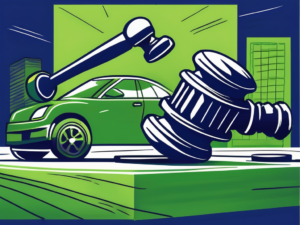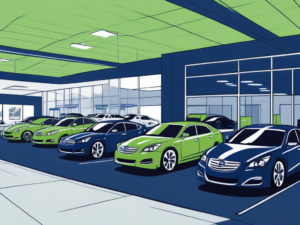Talk to Sales: (401) 200-6026

If you are passionate about cars and have a strong entrepreneurial spirit, starting your own car dealership business can be an exciting and lucrative venture. However, building a profitable car dealership business from scratch requires careful planning, market understanding, and a solid financial foundation. In this step-by-step guide, we will explore the key aspects of starting a car dealership business and provide valuable insights to help you succeed.
Understanding the Car Dealership Business
Starting a car dealership business requires a comprehensive understanding of the industry and its dynamics. The car dealership industry involves the buying and selling of new and used vehicles to consumers or other businesses. It encompasses various segments, such as passenger cars, commercial vehicles, and luxury automobiles.
As a car dealer, your primary goal is to acquire vehicles at wholesale prices and sell them at a profit. However, this is just the tip of the iceberg. To succeed in this competitive market, you will need to establish strong relationships with suppliers, manage your inventory effectively, negotiate prices, and provide exceptional customer service.
Let’s delve deeper into the key aspects of the car dealership business.
The Basics of the Car Dealership Industry
The car dealership industry is a complex and multifaceted sector that requires a deep understanding of market trends and consumer preferences. It is essential to keep up with the latest developments and technological advancements in the automotive industry to stay ahead of the competition.
When it comes to the types of vehicles you can sell, the possibilities are vast. From compact cars to SUVs, from electric vehicles to hybrid models, the choices are endless. Understanding the different vehicle segments and their unique characteristics will help you cater to a wide range of customer preferences.
Moreover, the car dealership business is not limited to just selling vehicles. Many dealerships offer additional services such as maintenance and repairs, financing options, and extended warranties. These value-added services can significantly enhance customer satisfaction and loyalty.
Key Players in the Car Dealership Market
To navigate the car dealership market successfully, it is crucial to be aware of the key players in the industry. Understanding their roles and characteristics will help you identify opportunities and develop a competitive edge.
Franchise Dealerships are one of the major players in the market. These dealerships have exclusive rights to sell new vehicles from a specific brand or manufacturer. They often offer additional services like maintenance and repairs, making them a one-stop-shop for customers.
Independent Dealerships, on the other hand, are not affiliated with any particular brand. They typically specialize in selling used vehicles and have more flexibility in terms of inventory selection and pricing. This flexibility allows them to cater to a broader range of customer budgets and preferences.
In recent years, online car marketplaces have gained significant popularity. These platforms connect buyers and sellers, facilitating transactions and providing extensive vehicle listings. Online car marketplaces offer convenience and a vast selection of vehicles, making them a preferred choice for many customers.
By understanding the strengths and weaknesses of these key players, you can position your dealership strategically and differentiate yourself from the competition.
Sell cars on the lot faster with AutoRaptor
Know if we’re the right fit within 10 minutes
Profitability Factors in the Car Dealership Business
While the car dealership business can be profitable, several factors contribute to your success. It is essential to consider these factors and implement effective strategies to maximize profitability.
Market Demand plays a crucial role in determining the success of your dealership. Assess the demand for vehicles in your target market. Are there specific vehicle types or brands that are highly sought after? Understanding market trends and consumer preferences will help you make informed decisions regarding your inventory selection.
Location is another critical factor. Choose a strategic location that ensures visibility, accessibility, and proximity to potential customers. A well-chosen location can significantly impact foot traffic and customer reach.
Pricing Strategy is a delicate balance. Set competitive prices that attract buyers while still allowing for a reasonable profit margin. Conduct market research and analyze your competitors’ pricing strategies to determine the optimal pricing for your vehicles.
Effective Inventory Management is essential to minimize holding costs and maximize turnover rate. Keep track of your inventory, analyze sales data, and adjust your purchasing decisions accordingly. Maintaining a diverse inventory that caters to different customer preferences can also help attract a wider customer base.
Customer Experience is a key differentiator in the car dealership business. Provide exceptional customer service and build long-term relationships with buyers. A satisfied customer is more likely to become a repeat customer and refer your dealership to others.
By considering these factors and implementing effective strategies, you can increase the profitability of your car dealership business. Remember, success in this industry requires continuous adaptation to changing market dynamics and a relentless focus on customer satisfaction.
Planning Your Car Dealership Business
Identifying Your Target Market
It is essential to identify your target market before launching your car dealership business. Consider factors such as demographics, income levels, preferences, and local competition. By understanding your target market’s needs and preferences, you can tailor your inventory and marketing efforts to attract the right customers.
Moreover, conducting market research will help you identify trends, predict demand, and adjust your business strategy accordingly.
Choosing the Right Location
The location of your car dealership can significantly impact your success. Look for areas with high foot traffic, easy access, and visibility. Consider the proximity to major roads, commercial hubs, and residential neighborhoods.
Additionally, check local zoning laws and regulations to ensure that your chosen location allows for car dealership activities. Consult with a real estate professional to find the best-fit location for your business.
Deciding on New or Used Cars
Another critical decision is whether to focus on selling new or used cars. Both options have their advantages, and your choice will depend on factors like market demand, available resources, and competition in your area.
Selling new cars might require establishing partnerships with specific manufacturers, meeting certain sales quotas, and complying with brand guidelines. On the other hand, selling used cars allows for more flexibility in terms of pricing, selection, and sourcing.
Sell cars on the lot faster with AutoRaptor
Know if we’re the right fit within 10 minutes
Legal Considerations for Car Dealerships
Necessary Licenses and Permits
Before opening your car dealership, you must obtain the necessary licenses and permits to operate legally. Consult with your local licensing agency or business regulatory authority to identify the specific requirements for your area.
Common licenses and permits typically include a dealer license, salesperson license, and potentially additional permits for vehicle storage, display, and vehicle registration.
Understanding Zoning Laws
Car dealerships are subject to zoning laws, which regulate the types of activities that can take place in specific areas. Ensure that your chosen location is zoned for car dealership activities or obtain the necessary permits or variances.
Consult with a legal professional or local zoning authorities to navigate the zoning regulations and avoid any potential issues.
Insurance Requirements for Car Dealerships
Obtaining comprehensive insurance coverage is crucial to protect your car dealership business from potential risks and liabilities. Insurance requirements may vary depending on your location and the type of vehicles you sell.
Common insurance policies for car dealerships include general liability insurance, inventory insurance, garage liability insurance, and workers’ compensation insurance. Consult with an insurance professional to design an insurance package that suits your specific needs.
Financing Your Car Dealership Business
Startup Costs for a Car Dealership
Starting a car dealership requires a significant upfront investment to cover various expenses. These may include:
- Property or lease costs for your dealership location.
- Initial inventory purchase.
- Licensing and permit fees.
- Office equipment, furniture, and signage.
- Marketing and advertising expenses.
- Insurance premiums.
Ensure you have a detailed business plan and secure adequate funding to cover these startup costs and sustain your business until it becomes profitable.
Securing Financing for Your Business
If you don’t have the necessary capital to finance your car dealership business, securing financing options can be a viable solution. Explore traditional banking options, government-backed loans, or private investors who specialize in financing car dealership startups.
Prepare a comprehensive business plan, financial projections, and supporting documents to increase your chances of obtaining financing. Demonstrate your knowledge of the industry, market analysis, and strategies for profitability to instill confidence in potential lenders or investors.
Managing Cash Flow in the Car Dealership Business
Effective cash flow management is vital in the car dealership business to ensure ongoing operations and sustained growth. Some key practices include:
- Implementing a robust accounting system to track revenue, expenses, and inventory.
- Regularly reviewing financial statements to identify trends, bottlenecks, and areas for improvement.
- Establishing relationships with reliable suppliers and negotiating favorable terms.
- Minimizing holding costs by optimizing inventory turnover.
- Being diligent with expenses and prioritizing cost control measures.
By continuously monitoring and managing your cash flow, you can navigate potential challenges and position your car dealership for long-term profitability.
Conclusion
Starting a profitable car dealership business from scratch requires careful planning, market understanding, and financial preparedness. By following this step-by-step guide, you can make informed decisions, overcome challenges, and build a successful car dealership enterprise. Remember to continuously adapt to market trends, provide exceptional customer service, and prioritize profitability to thrive in the competitive car dealership industry.
Want to improve your sales and move cars off the lot faster? Book a test drive with AutoRaptor to see how our simple dealership CRM software can help you close more deals effectively.
Subscribe to our Newsletter
Resources to help your dealership convert more leads into sales, retain more customers, and market inventory smarter, straight to your inbox every Sunday.




